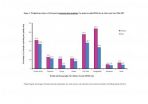(Press-News.org) Medical staff struggle to spot problem drinking in their patients unless they are already intoxicated, according to research by the University of Leicester.
The work led by Dr Alex J Mitchell, consultant at Leicestershire Partnership NHS Trust and honorary senior lecturer at the University, reveals that clinical staff often overlook alcohol problems in their patients when they do not present intoxicated.
In a new study published in the British Journal of Psychiatry today (1 August) involving 20,000 patients assessed for alcohol problems by medical staff, all clinicians struggled to detect alcohol problems whether or not patients volunteered information regarding their drinking.
1 in 4 of the adult population in England (33% of men and 16% of women) consumes alcohol in a way that is potentially harmful to their health and 6% of men are alcohol dependent (Pilling et al, 2011). 1 in 6 primary care patients have an alcohol use disorder or are alcohol dependent.
General practitioners (GPs) identified 40% of problem drinkers, hospital doctors identified 50% of problem drinkers and mental health specialists recognised 55% of problem drinkers. Clinicians correctly recorded a diagnosis in the case-notes for only 1 in 3 people who had an alcohol problem. Only alcohol intoxication was accurately identified. A&E clinicians were able to correctly detect patients with alcohol intoxication in 9 out of 10 patients. In research studies where patients admitted to a drinking problem by self report, the same rates of under-detection occurred.
Assessing for alcohol problems in patients using a short questionnaire is recommended by the UK Primary Care Service Framework and NICE but not widely implemented by clinicians.
Dr Alex Mitchell said: "This study highlights that clinical identification of alcohol problems is challenging in busy clinical environments. When clinicians try and spot alcohol problems they often miss patients who have serious alcohol problems but who are not currently intoxicated. Further they can misidentify about 5% of 'normal drinkers' as problem drinkers.
"Clinicians are not always sure what questions to ask or what screening tests to apply. We did not find that patients refused to admit alcohol problems, in fact it was more common for patients to disclose problem drinking when asked to self-report than the number found by clinicians judgement alone.
"There needs to be a greater awareness of the importance of carefully assessing alcohol problems for non-intoxicated patients. Patient responses to questioning about drinking habits should not be assumed to be misleading but questioning must be handled sensitively."
INFORMATION:
Notes to editors:
For more information contact Dr Alex J Mitchell on ajm80@le.ac.uk. Additional information is available via the website www.psycho-oncology.info
References:
Alex J Mitchell AJ, Meader N, Bird V, Rizzo M. Clinical recognition and recording of alcohol disorders by clinicians in primary and secondary care: meta-analysis. British journal of Psychiatry August 2012
Pilling S, Yesufu-Udechuku A, Taylor C, Drummond C; Guideline Development Group. Diagnosis, assessment, and management of harmful drinking and alcohol dependence: summary of NICE guidance. BMJ. 2011 Feb 23;342:d700. doi: 10.1136/bmj.d700.
New study suggests clinicians overlook alcohol problems if patients are not intoxicated
Medical staff often miss problem drinkers
2012-08-01
ELSE PRESS RELEASES FROM THIS DATE:
DMP module on heart failure: Current guidelines indicate some need for revision
2012-08-01
The German Institute for Quality and Efficiency in Health Care (IQWiG) published the results of a literature search for evidence-based clinical practice guidelines on the treatment of people with heart failure. The aim of the report is to identify those recommendations from current guidelines of high methodological quality that may be relevant for the planned revision of the module "heart failure" in the disease management programme (DMP) for coronary heart disease (CHD). According to the results of the report, there is no compelling need for revision of any part of the ...
Better student preparation needed for university maths
2012-08-01
Moving from sixth form, or college, into higher education (HE) can be a challenge for many students, especially those who start mathematically demanding courses. Life prior to university focuses on achieving maximum examination success to be sure of a place. Faced with this pressure, school and college maths courses pay little attention to preparing students to use maths in other areas of study according to a project funded by the Economic and Social Research Council (ESRC).
A student's ability to apply mathematical reasoning is critical to their success, especially in ...
Strangers on a bus: Study reveals lengths commuters go to avoid each other
2012-08-01
You're on the bus, and one of the only free seats is next to you. How, and why, do you stop another passenger sitting there? New research reveals the tactics commuters use to avoid each other, a practice the paper, published in Symbolic Interaction describes as 'nonsocial transient behavior.'
The study was carried out by Esther Kim, from Yale University, who chalked up thousands of miles of bus travel to examine the unspoken rules and behaviors of commuters.
Over three years Kim took coach trips across the United States. Kim's first trip, between Connecticut and New ...
Global 'sleeplessness epidemic' affects an estimated 150 million in developing world
2012-08-01
Levels of sleep problems in the developing world are approaching those seen in developed nations, linked to an increase in problems like depression and anxiety.
According to the first ever pan-African and Asian analysis of sleep problems, led by Warwick Medical School at the University of Warwick, an estimated 150 million adults are suffering from sleep-related problems across the developing world.
The results are published in a study in the journal Sleep.
Warwick Medical School researchers have found a rate of 16.6 per cent of the population reporting insomnia and ...
Too cool to follow the law
2012-08-01
So-called glass-formers are a class of highly viscous liquid materials that have the consistency of honey and turn into brittle glass once cooled to sufficiently low temperatures. Zhen Chen and his colleagues from Arizona State University, USA, have elucidated the behaviour of these materials as they are on the verge of turning into glass in an article about to be published in EPJ E¹.
Although scientists do not yet thoroughly understand their behaviour when approaching the glassy state, this new study, which relies on an additional type of dynamic measurements, clearly ...
Rewarding work for butterflies
2012-08-01
Butterflies learn faster when a flower is rewarding than when it is not, and females have the edge over males when it comes to speed of learning with rewards. These are the findings of a new study, by Dr. Ikuo Kandori and Takafumi Yamaki from Kinki University in Japan. Their work, published online in Springer's journal Naturwissenschaften - The Science of Nature, is the first to investigate and compare the speed at which insects learn from both rewarding and non-rewarding experiences.
Learning is a fundamental mechanism for adjusting behavior to environmental change. ...
Controlling gene expression with hydrogen peroxide 'switches'
2012-08-01
Hydrogen peroxide doesn't just come in bottles from the drugstore – the human body makes it as well. Now researchers from North Carolina State University have found a way to use naturally occurring hydrogen peroxide inside cells to switch on gene expression. Their method also serves as a highly sensitive hydrogen peroxide detector, which may help scientists determine the molecule's role in cellular health and disease.
In a normally functioning cell, hydrogen peroxide serves as a messenger, carrying signals through a cell in order to allow the cell to respond to external ...
New FDA program adds to tools to curb opiod abuse in United States
2012-08-01
PHILADELPHIA -- A new risk management plan from the U.S. Food and Drug Administration to help clinicians properly prescribe drugs with addiction potential aims to help reduce the growing epidemic of opioid abuse in the United States. With deaths associated with these drugs, often sold illegally, now reaching toward 14,000 each year – including the fatal shootings of two Philadelphia teenagers last week in a house where police found large quantities of Percocet and morphine, prescription drug pads, and more than $100,000 in cash -- the authors of a Viewpoint piece in the ...
Dartmouth theoretical physicists probe the Majorana mystery
2012-08-01
With headlines proclaiming the discovery of the Higgs boson—the so-called God particle—particle physics has captured the imagination of the world, particularly among those who dwell on the nature of the cosmos. But this is only one puzzle seemingly solved in a universe of mysteries. In a recent paper in Physical Review Letters, Dartmouth physicists delve into another enigmatic particle.
Majorana is a name whose very mention evokes a veil of mystery. On one level, it refers to a mysterious particle that may exist on the boundary of matter and antimatter. Curiously, it ...
Jailhouse phone calls reveal when domestic abusers most likely to attack
2012-08-01
COLUMBUS, Ohio – An analysis of jailhouse phone calls between men charged with felony domestic violence and their victims allowed researchers for the first time to see exactly what triggered episodes of violent abuse.
The findings showed that violence often immediately followed accusations of sexual infidelity made by one or both of the partners. Drug or alcohol use was often involved.
Researchers have long known that sexual jealousy played a general role in abuse, but this is the first time it was shown that it was a specific form of jealousy – infidelity concerns ...
LAST 30 PRESS RELEASES:
Blood test “clocks” predict when Alzheimer’s symptoms will start
Second pregnancy uniquely alters the female brain
Study shows low-field MRI is feasible for breast screening
Nanodevice produces continuous electricity from evaporation
Call me invasive: New evidence confirms the status of the giant Asian mantis in Europe
Scientists discover a key mechanism regulating how oxytocin is released in the mouse brain
Public and patient involvement in research is a balancing act of power
Scientists discover “bacterial constipation,” a new disease caused by gut-drying bacteria
DGIST identifies “magic blueprint” for converting carbon dioxide into resources through atom-level catalyst design
COVID-19 vaccination during pregnancy may help prevent preeclampsia
Menopausal hormone therapy not linked to increased risk of death
Chronic shortage of family doctors in England, reveals BMJ analysis
Booster jabs reduce the risks of COVID-19 deaths, study finds
Screening increases survival rate for stage IV breast cancer by 60%
ACC announces inaugural fellow for the Thad and Gerry Waites Rural Cardiovascular Research Fellowship
University of Oklahoma researchers develop durable hybrid materials for faster radiation detection
Medicaid disenrollment spikes at age 19, study finds
Turning agricultural waste into advanced materials: Review highlights how torrefaction could power a sustainable carbon future
New study warns emerging pollutants in livestock and aquaculture waste may threaten ecosystems and public health
Integrated rice–aquatic farming systems may hold the key to smarter nitrogen use and lower agricultural emissions
Hope for global banana farming in genetic discovery
Mirror image pheromones help beetles swipe right
Prenatal lead exposure related to worse cognitive function in adults
Research alert: Understanding substance use across the full spectrum of sexual identity
Pekingese, Shih Tzu and Staffordshire Bull Terrier among twelve dog breeds at risk of serious breathing condition
Selected dog breeds with most breathing trouble identified in new study
Interplay of class and gender may influence social judgments differently between cultures
Pollen counts can be predicted by machine learning models using meteorological data with more than 80% accuracy even a week ahead, for both grass and birch tree pollen, which could be key in effective
Rewriting our understanding of early hominin dispersal to Eurasia
Rising simultaneous wildfire risk compromises international firefighting efforts
[Press-News.org] New study suggests clinicians overlook alcohol problems if patients are not intoxicatedMedical staff often miss problem drinkers


